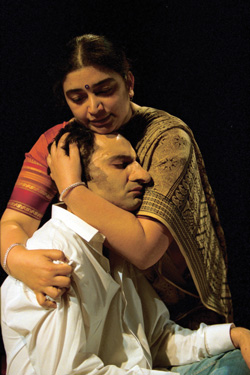|
|
 |
 |
 |
 |
|
AROUND THE QUADSMidnight's Children Takes Apollo StageHumanities Festival To Accompany Royal Shakespeare Company Production of Salman Rushdie NovelBY ALEX SACHARE '71The Royal Shakespeare Company production of Salman Rushdie’s Booker Prize-winning novel, Midnight’s Children, will take over the stage at Harlem’s historic Apollo Theatre for 12 performances from March 21–30. The play, written by Rushdie, Simon Reade and Tim Supple, debuted in London in January and will visit the University of Michigan from March 12–16 before coming to the Apollo.
The evening performance on Saturday, March 22, has been designated as Alumni Night. Alumni are being offered a 20 percent discount off regular ticket prices, which range from $20 to $80, plus a $2 per ticket Apollo Theater restoration fee, for this performance or the evening preview on Friday, March 21. Alumni only can receive this discount (or a 10 percent discount to any other performance) by calling the special Alumni Hotline, (212) 870-2537. Tickets, including student prices of $10 with CUID and $20 for others, also are on sale at the Apollo Theater box office, at the Miller Theatre box office on campus and through Ticketmaster. To enhance the theater-going experience, the University is conducting a month-long Humanities Festival throughout March, with events including dialogues, debates, readings and roundtables. The idea behind the festival, most of which will take place at venues on and around campus such as Miller Theatre, Altschul Auditorium, Casa Italiana and Riverside Church, is to deepen the experience of viewing the performance through an exploration of the ideas embedded in the play with scholars, writers, theater artists and cultural commentators. The festival will draw upon people in many fields, including law, history, comparative literature, anthropology, cultural studies and the performing arts. Tickets for nearly all the Humanities Festival events are priced at $5 and are available through the Alumni Hotline or at the Miller Theatre box office. There also will be a panel discussion at the Asia Society (Park Avenue and 70th Street) on Monday, March 17 (tickets $10, $7 for society members), as well as exhibitions at the Leroy Neiman Gallery in Dodge Hall and at the Apollo Theater. Log onto www.MidnightsChildrenNYC.com for the latest information regarding the stage production or the Humanities Festival. In addition, Columbia’s Double Discovery Center is bringing the excitement of the production to neighborhood high schools. The DDC is coordinating visits by instructors in the Core Curriculum and members of the Midnight’s Children cast to school classes for in-class workshops about the play and the creative process. Students then will attend a matinee performance of the play on Tuesday, March 25. For more on the DDC component, please see page 15. Columbia’s sponsorship of the RSC’s New York production as well as the accompanying Humanities Festival, and the DDC’s involvement, is the beginning of what President Lee C. Bollinger envisions as an expanded role for the University in the arts. “It is the responsibility of great universities to support the arts. This unparalleled partnership among Columbia, the Royal Shakespeare Company and the Apollo Theater will yield a unique educational, artistic and community event,” said Bollinger, who will conduct an interview with Rushdie on March 22 as part of the Humanities Festival.
“This is not simply a performing arts organization saying, ‘Watch this performance,’ ” Bollinger noted. “It will be much more: the integration of the arts organization and the University, great for the cultural institution and great for society. “Universities and cultural institutions are natural allies in seeking to understand the human condition. When they work together, the best of both worlds are integrated and intellectual growth is fostered through panel discussions, academic courses and lectures that complement the artistic endeavor. Both art and the entire academic community — including students, faculty and our neighbors — benefit dramatically.” Promotional material describes Midnight’s Children is described in as a “kaleidoscopic tale of modern India, told through the eyes of Saleem, born at the stroke of midnight on August 15, 1947, the moment of Indian independence from Britain. Swapped at birth, his life becomes magically entwined with the destinies of the twin nations — Pakistan and India — and he becomes a symbol of his homeland.” Dean Austin Quigley attended a performance of Midnight’s Children in London in January and returned enthusiastic about the scope of the play and the performance of its star, Zubin Varla. “As a theatrical event, it is exhilarating and fascinating,” he said, noting that the production is every bit as rich and complex as the Rushdie novel. There will be evening performances from Friday, March 21, through Sunday, March 30, with the exceptions of Sunday, March 23, and Wednesday, March 26. In addition to the student matinee, there will be matinee performances on Sunday, March 23, Saturday, March 29 and Sunday, March 30. Rushdie is scheduled to participate in two Humanities Festival events: the interview with Bollinger and a discussion with co-playwright Reade about moving the novel to the stage, both on Saturday, March 22. Cast members will participate in an open table rehearsal on March 26 at the Black Box Theatre in Alfred Lerner Hall. Among those scheduled to participate in festival events, in addition to Bollinger, Rushdie, Reade and cast members from the play, are Pulitzer Prize-winner writers Michael Cunningham and Margo Jefferson; faculty, including Edward Said, Manning Marable, James Shapiro ‘77, Nicholas Dirks, Eduardo Machado, Peter Awn, Todd Gitlin, Coco Fusco, Partha Chatterjee, E. Valentine Faniel, Gauri Viswanathan, Patricia J. Williams, Sreenath Sreenivasan and Akeel Bilgrami; and many other luminaries. Topics will include the creative process, theater and writing; colonialism, independence and beyond; contemporary culture; censorship, race and civil rights; and literature and literary traditions.
|
|
|||||||||||||||||||||||||||||||||||||||||||||||||||||||||||

